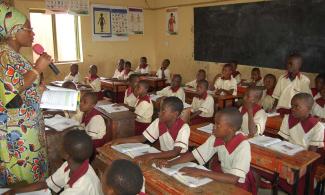
The approval was issued at the Federal Executive Council (FEC) meeting held at the Presidential Villa on Wednesday, which was presided over by President Muhammadu Buhari in Abuja.
The Nigerian government has approved a new National Language Policy which makes the mother tongue a compulsory medium of instruction from Primary 1 to 6.
The approval was issued at the Federal Executive Council (FEC) meeting held at the Presidential Villa on Wednesday, which was presided over by President Muhammadu Buhari in Abuja.
Minister of Education, Adamu Adamu, who disclosed this while briefing journalists on the outcomes of the council meeting, said though the government is aware that implementation will be challenging, the government has made the mother tongue the only medium of instruction for the first six years of education.
He explained that after primary education, English and mother tongue will be combined from the start of junior secondary school.
According to the minister, though the policy has officially taken effect, it can only be fully implemented when the government has developed instructional materials and made provisions for qualified teachers.
Adamu explained that the mother tongue to be used in each school will be the dominant language spoken by the community where it is located, Daily Sun reports.
So much has been lost owing to the extinction of some local languages, he said, adding that the government is determined to preserve cultures.
He noted that all Nigerian languages are equal and will be treated as such.
He said, “A memo on national policy was approved by the council. So, Nigeria now has a National Language Policy and the details will be given later by the ministry.
“One of the highlights is that the government has agreed now that henceforth, instruction in primary schools; the first six years of learning will be in the mother tongue."
The minister said the decision is only in principle for now because it will require a lot of work to implement it.
“Theoretically, this policy starts from today and the use of mother tongue is exclusive but we need time to develop the material, get the teachers and so on. Since the first six years of school should be in the mother tongue where the pupil is, the language of the host community is what will be used.
“Because we have 625 languages at the last count and the objective of this policy is to promote and enhance the cultivation and use of all Nigerian languages,” he added.
Adamu said the council also approved a consultancy services agreement between Joint Admission and Matriculation Board (JAMB) and a private company, for the upgrade of the portal on which the board inputs records of candidates seeking admission into higher institutions of learning.